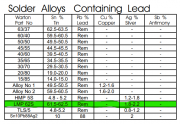Well, there are 2 decks waiting for some fixing and adjusting but I'm just feeling myself too lazy and keep telling to myself "next week" under the last 3 or maybe little longer...
However, not so lazy to think and two things/questions just came up:
and two things/questions just came up:
1. How many watts is needed for some minor soldering. Planning to re-flow my soldering station since that there is a cold joint somewhere. Was thinking to buy some simple solder pen. Price is about the same for 30W and 60W, but I would rather go for 30W, don't want to apply unnecessary heat to a PCB. You think that 30W is enough?
2. Just found out that soldering wire I'm using is leaded. It is one of better soldering wires on the market Warton metals AutoSol 62S with 2% silver and flux core. Wondering, how "dangerous" lead actually is? I mean, surely is for someone who is soldering 8 hours a day, but to solder some resistor here and there?! What are you using, do you care about lead/lead-free?

BTW, what does "Rem" means?
However, not so lazy to think
1. How many watts is needed for some minor soldering. Planning to re-flow my soldering station since that there is a cold joint somewhere. Was thinking to buy some simple solder pen. Price is about the same for 30W and 60W, but I would rather go for 30W, don't want to apply unnecessary heat to a PCB. You think that 30W is enough?
2. Just found out that soldering wire I'm using is leaded. It is one of better soldering wires on the market Warton metals AutoSol 62S with 2% silver and flux core. Wondering, how "dangerous" lead actually is? I mean, surely is for someone who is soldering 8 hours a day, but to solder some resistor here and there?! What are you using, do you care about lead/lead-free?

BTW, what does "Rem" means?
